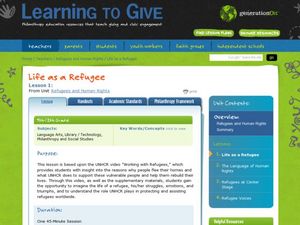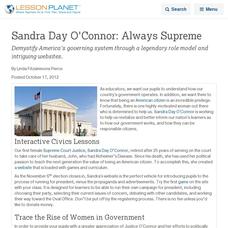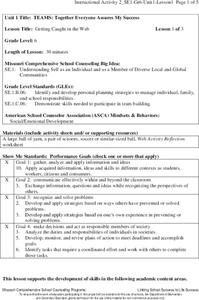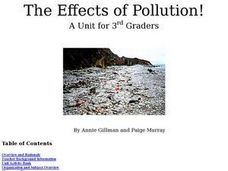Center for History and New Media
Slavery and Free Negroes, 1800 to 1860
What was life like for enslaved and free black people before the American Civil War? Explore the building tension between states and the freedom of individuals with a thorough social studies lesson. Learners of all ages explore...
Center for History and New Media
A Look at Virginians During Reconstruction, 1865-1877
The transition between rebellion to reunification was not smooth after the Civil War. Young historians compare primary and secondary source documents in a study of the Reconstruction era in Virginia, noting the rights that were not...
Center for History and New Media
The Impact of the Jim Crow Era on Education, 1877–1930s
Even though American slaves were officially emancipated in 1865, the effects of slavery perpetuated throughout the 19th and 20th centuries. Middle and high schoolers learn about the ways that discrimination and the Jim Crow laws...
Pacific University Oregon
Civil Rights: US History
To gain an understanding of the Civil Rights Movement of the 1960s, class members investigate the Jim Crow Laws, the Emancipation Proclamation, the 13th, 14th, and 15th Amendments of the US Constitution, and the 1898 Supreme Court case,...
Curated OER
Woodrow The White House Mouse
Inauguration Day is January 20. Implement an entire week's worth of mini activities to help young historians become knowledgeable of the President's job, the executive branch, and the White House. The worksheets focus on...
Curated OER
Life as a Refugee
Lesson 1 from a Refugees and Human Rights unit is based on the UNHCR video “Working with Refugees.” Pupils gain an understanding of the role the United Nations plays in protecting and assisting refugees worldwide and have an opportunity...
Curated OER
Sandra Day O'Connor: Always Supreme
Demystify America's governing system through a legendary role model and a fabulous website.
Curated OER
Barnyard Protest: Cows, Chickens & Fundamental Freedoms
Here is an ambitious and engaging lesson that should help elementary schoolers begin to develop a basic understanding of human rights. Pupils are asked to think about their own rights, the rights of others, and how an individual's voice...
Canadian Civil Liberties Education Trust
That’s Not Fair!
As part of a series of critical thinking exercises, kids consider issues of social justice, especially the factors that must be considered when trying to balance conflicting rights and freedoms.
Curated OER
We Must Not Be Enemies: Lincoln's First Inaugural Address
Learners complete a unit of lessons on the historical context and significance of Lincoln's inaugural address. They analyze archival documents, campaign posters, historical photographs, and primary source documents, and listen to songs...
Facing History and Ourselves
Do You Take the Oath?
Why did so many go along with Nazi policies during World War II? An investigatory unit includes four handouts, reading analyses, classroom discussion topics, and intriguing philosophical questions, helping learners understand the...
Missouri Department of Elementary
Getting Caught in the Web
When it comes to teamwork, it's best not to drop the ball. Pupils stand in a circle, tossing around a ball of yarn to one another to create a web. Next, they use teamwork skills to keep a soccer ball from falling off the web before...
K12 Reader
Three Levels of Government
Help your learners work their way through a reading assignment for informational text. Using context clues, they answer five comprehension question based on a short passage about the three levels of government: local government, state...
National Endowment for the Humanities
Revolution '67, Lesson 1: Protest: Why and How
To some people, protesting is as American as apple pie, but the factors that lead to protests can be as confusing to veteran activists as to today's youth. Revolution '67 explores the riots in Newark, New Jersey as a case study. ...
National Endowment for the Humanities
Revolution '67, Lesson 2: What Happened in July 1967? How Do We Know?
Even in a world in which dozens of participants and curious onlookers record every controversial event, the basic facts of what happened are often in dispute. Revolution '67, Lesson 2 explores 1967 Newark, New Jersey using an examination...
Center for History and New Media
The Daily Experience of the Laurel Grove School, 1925
What was daily life like for those attending segregated schools in 1925? Modern learners fill out a KWHL chart as they explore historical background and primary source documents about the Laurel Grove School in Fairfax County, Virginia....
Northern Ireland Curriculum
Festivals: Learning for Life and Work
How do different communities celebrate special occasions? After researching celebrations in their countries, class members investigate other festivals like those associated with Ramadan, Diwali, Chinese New Year, Halloween, Easter,...
Library of Virginia
Life as an Enslaved People
As part of a study of slavery in the United States, class members analyze documents related to the sale of slaves. They consider not only the text of the bills of sale but also what the appearance of the broadsides suggest.
Library of Virginia
Life as a Liberated People
Imagine having no control over your life and then suddenly having to provide for yourself. Such was the challenge faced by many American slaves after emancipation. Class members are asked to consider these challenges are they examine...
Library of Virginia
Antebellum Freedom
From indentured servitude to involuntary race-based servitude, slavery has taken many forms in American history. Class members examine three manumission petitions that reveal how the rights of African Americans and African American...
Curated OER
Presidential Speeches
Listen to and analyze a presidential speech in order to explain the principles held by the president and the historical context in which the speech was made. Then hold a campaign and election simulation involving featured presidents.
Curated OER
The Effects of Pollution!
Learners examine pollution and how it affects the environment. They discuss how human activities lead to more pollution. They talk about the importance of recycling. There is a skit, resource links, and activities provided to make this a...
Curated OER
American History Through the Len of the Supreme Court Decisions
Students examine the historical background of Supreme Court decisions and the basic principles behind legislation. As part of the instructional activity, students discover legal concepts and terms and write sentences using the vocabulary...
Curated OER
The Black Death and HIV/AIDS: Which is the Worse Plague?
Exploring the similarities and differences between the Black Death and HIV/AIDS, students write persuasive essays answering which is the "worse plague." This cross-curricular activity between Language Arts and Social Studies addresses...

























